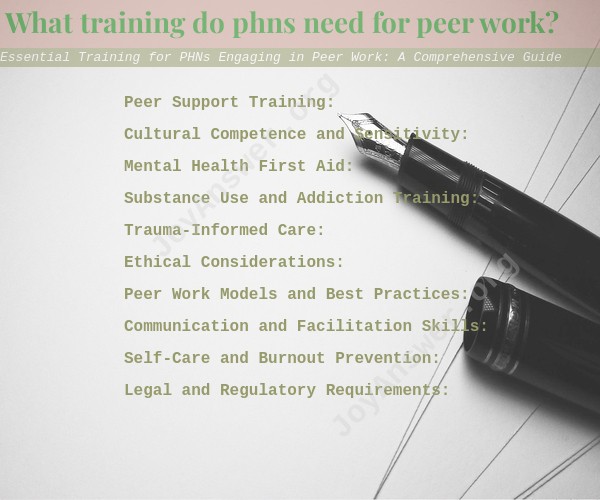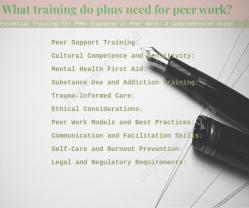What training do phns need for peer work?
Public Health Nurses (PHNs) engaging in peer work, which involves providing support and assistance to individuals from similar backgrounds or with shared experiences, require specific training to be effective in their roles. The training needs for PHNs involved in peer work can vary based on the specific context and population they are serving, but some essential components typically include:
Peer Support Training: PHNs need to undergo training in the principles and techniques of peer support. This training helps them understand the dynamics of peer relationships, active listening, empathy, and how to provide non-judgmental support to individuals facing health-related challenges.
Cultural Competence and Sensitivity: If PHNs are working with diverse populations, they should receive training in cultural competence and sensitivity. This training helps them understand and respect cultural differences, which is crucial for building trust and rapport with peers from various backgrounds.
Mental Health First Aid: Many peer support roles involve assisting individuals with mental health challenges. PHNs should receive training in mental health first aid, which equips them with the skills to recognize signs of mental health issues, provide initial support, and refer individuals to appropriate resources.
Substance Use and Addiction Training: For PHNs working with individuals dealing with substance use disorders, training in addiction and harm reduction principles is essential. This includes understanding the impact of different substances, withdrawal symptoms, and strategies for reducing harm.
Trauma-Informed Care: Training in trauma-informed care helps PHNs recognize the signs of trauma and respond in a supportive and non-retraumatizing way. This is especially important when working with individuals who have experienced trauma.
Ethical Considerations: PHNs need to be trained in ethical considerations specific to peer support. This includes confidentiality, boundaries, and informed consent when working with peers.
Peer Work Models and Best Practices: PHNs should be familiar with peer work models and best practices. Understanding different peer support models, such as the Wellness Recovery Action Plan (WRAP) or Intentional Peer Support, can inform their approach.
Communication and Facilitation Skills: Effective communication and facilitation skills are crucial for leading support groups, workshops, or one-on-one peer interactions. Training in group dynamics and communication techniques can enhance these skills.
Self-Care and Burnout Prevention: Peer work can be emotionally demanding. PHNs need training in self-care strategies and how to prevent burnout to ensure their well-being while supporting others.
Legal and Regulatory Requirements: PHNs should be aware of the legal and regulatory requirements related to their role in peer support, including issues of consent and privacy.
The specific training requirements may vary depending on the organization, the population served, and the nature of the peer work. It's important for PHNs to receive ongoing training and supervision to stay current in their roles and continue providing effective support to their peers. Additionally, they may need to seek certification or accreditation in peer support, depending on the organization's requirements and standards.





